As the busy summer travel season ramps up, it’s not too late to apply for a credit card that can maximize savings on your next vacation. From big international trips to family beach vacations or even local weekend excursions, a great travel credit card can help you save money this summer.
We’ve rounded up some of our favorite travel cards available now — no matter where you’re heading.
In this article:
The best credit cards for vacations for June 2024
These are our top picks for credit cards to take on your upcoming vacation. Find the right card for you based on the travel perks, top rewards categories, or type of travel you value most.
Annual fee: $95
Welcome offer: Earn 75,000 miles after spending $4,000 within the first 3 months
Rewards:
Recommended credit score: Good to excellent
Why we like it: Earning and redeeming travel rewards is easy with the Capital One Venture Rewards Card. You’ll earn a flat 2x miles on every purchase you make and can use those miles toward future travel. Either redeem miles toward travel purchases you make with your card (within 90 days) or use them to book through Capital One Travel. Your miles are generally worth a standard 1 cent each.
More Capital One Venture travel features include a boosted 5x rewards when you book hotels and rental cars with Capital One Travel, as well as access to Lifestyle Collection hotels and a $50 experience credit when you book through Capital One Travel. Finally, get up to $100 in statement credits for TSA PreCheck or Global Entry fees.
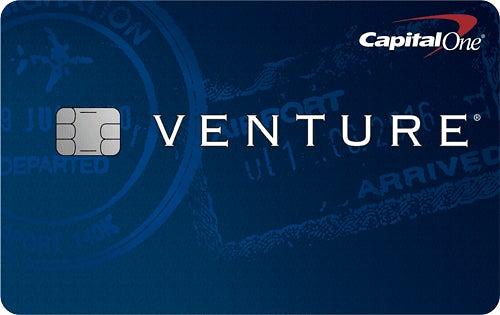
Annual fee: $250 (see rates & fees)
Welcome offer: Earn 60,000 points after spending $6,000 within the first 6 months
Rewards:
4x points at restaurants worldwide
4x points at U.S. supermarkets (up to $25,000 spent per year, then 1x)
3x points on flights booked directly with airlines or through Amex Travel
1x points on all other purchases
Recommended credit score: Good to excellent
Why we like it: Thanks to its impressively high rewards rate at restaurants and supermarkets, the Amex Gold card can help you rack up points on food you buy at home to put toward your next vacation. With 4x points per dollar, this is one of the highest-earning cards for both categories available today.
You can use more Amex Gold perks to save money both at home and while traveling. Get up to $120 each year ($10 per month) in Uber Cash when you add your card to your Uber account, and up to another $120 annually ($10 per month) in statement credits for purchases at Grubhub, The Cheesecake Factory, Goldbelly, Wine.com, Milk Bar, and select Shake Shack locations. Finally, you can book The Hotel Collection hotels through Amex Travel and get up to $100 in experience credit during your stay (with a two-night minimum).
When you’re ready to use your Amex Gold points, put them toward your vacation costs for the best value. You’ll get up to 1 cent per point value when you redeem rewards for flights through Amex Travel, or you could reap even more value by transferring your points to Amex airline and hotel partners.
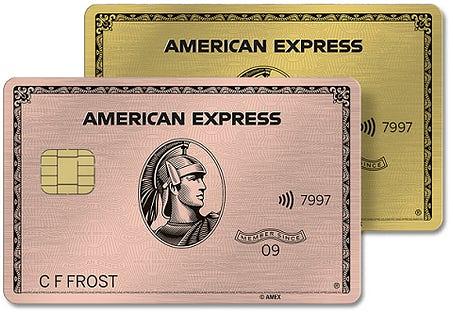
Annual fee: $95
Welcome offer: Earn 60,000 points after spending $4,000 within the first 3 months
Rewards:
5x points on travel through Chase Travel (not including hotels that count toward the $50 annual hotel credit)
3x points on dining
3x points on online grocery purchases (not including Walmart, Target, or wholesale clubs)
3x points on select streaming services
2x points on all other travel
1x points on all other purchases
Recommended credit score: Good to excellent
Why we like it: The Chase Sapphire Preferred has a diverse range of rewards categories — from dining to streaming services to travel — but that’s only the beginning of what makes this card valuable.
When you’re ready to redeem, you can get up to 1.25 cents per point for travel booked through Chase. Take the 60,000-point welcome bonus, for example: Those points are worth up to $750 in travel purchases when you use the Chase Travel portal. By comparison, a solid redemption for travel rewards is typically around 1 cent per point.
Other Chase Sapphire Preferred travel benefits include up to $50 in annual credits for eligible hotel bookings you make through Chase Travel, plenty of travel protections, and the option to transfer your rewards points to Chase’s airline and hotel partners. Chase partners offer more annual benefits, including Lyft, DoorDash, and Instacart.
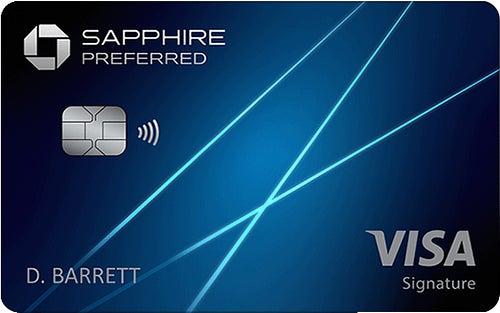
Annual fee: $0
Welcome offer: Earn $200 after spending $500 within the first 3 months
Rewards:
5% cash back on hotels and rental cars booked through Capital One Travel
3% cash back on dining, entertainment, popular streaming services, and at grocery stores
1% cash back on all other purchases
Recommended credit score: Good to excellent
Why we like it: The Capital One SavorOne card and its rewards categories can make the perfect choice for carrying on your next trip, with 3% cash back on common travel expenses like dining out and entertainment — including tourist attractions, amusement parks, concerts, and sporting event tickets. Meanwhile, you can use those same categories (plus streaming services and grocery stores) to make the most of your spending at home.
The SavorOne card also offers a solid 0% introductory APR for 15 months on both new purchases and balance transfers. Added Uber benefits are another travel-friendly feature: Earn 10% back on Uber rides and Uber Eats spending, plus complimentary Uber One membership through Nov. 14, 2024.
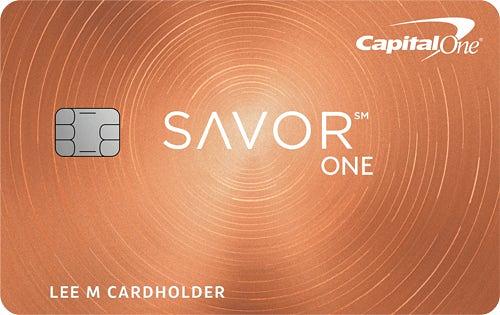
Annual fee: $0
Welcome offer: Earn 20,000 points after spending $1,000 within the first 3 months
Rewards:
3x points at restaurants, gas stations, and EV charging stations, on travel, transit, popular streaming services, and phone plans
1x points on all other purchases
Why we like it: If your vacations involve driving to your destination rather than air travel, look for a travel card that rewards all the trips you’ll make to gas stations along the way — like the no-annual-fee Wells Fargo Autograph.
You can get a competitive 3x points at gas stations and electric vehicle charging stations. Earn the same amount on other expenses you’re likely to incur on the road, such as dining at restaurants, transit (which includes parking and tolls), and any hotel stays (which fall under the travel category).
In addition to your travel rewards, there’s an introductory 0% APR on new purchases for the first 12 months, which you can use to help finance your trip — as long as you pay down the balance before the period ends. Redeem your points for travel purchases, statement credits, deposits into a Wells Fargo account, gift cards, and more.
Annual fee: $95
Welcome offer: Earn 60,000 points after spending $4,000 within the first 90 days
Rewards:
Why we like it: The Bank of America Premium Rewards Card is another solid option for cardholders who want simplicity when it comes to earning rewards.
Existing Bank of America customers get even more value. Like other credit cards from the bank, you can boost your rewards earnings by 25% to 75% if you have a qualifying account and balance with Bank of America’s Preferred Rewards program. In other words, you could get up to 3.5x points on travel and dining and up to 2.62x points on all other spending.
It also offers annual travel credits to help offset the fee cost. These include up to $100 in statement credits for airline incidental charges (upgrades, baggage fees, lounge access, etc.) and up to $100 in statement credits toward TSA PreCheck or Global Entry fees every four years.
Rewards points are generally worth about 1 cent each, and you can redeem them for statement credits, gift cards, deposits into eligible bank accounts, or through Bank of America’s Travel Center.
Annual fee: $695 (see rates & fees)
Welcome offer: Earn 80,000 points after spending $8,000 within the first 6 months
Rewards:
5x points on flights booked directly with airlines or through Amex Travel (up to $500,000 spent per year)
5x points on prepaid hotels booked through Amex Travel
1x points on all other spending
Recommended credit score: Good to excellent
Why we like it: The Amex Platinum Card earned a spot on this list thanks to its complimentary hotel status benefit — you’ll get automatic Marriott Gold Elite Status and Hilton Honors Gold Status. Other hotel benefits include up to $200 in annual statement credits when you book eligible stays through Amex Travel and access to The Hotel Collection and Fine Hotels + Resorts program, which both come with added amenities and credits when you book.
The Platinum Card from Amex also offers frequent travelers a wide range of annual benefits. Here’s a rundown of some of the most valuable travel credits and perks:
Global Lounge Collection airport lounge access
Up to $200 in airline fee credits for your chosen airline
Up to $200 annual Uber Cash ($15 per month and a bonus $20 in December)
Up to $189 in statement credits for CLEAR Plus membership
Complimentary status with select rental car programs
There are even perks for frequent cruise travelers; the Cruise Privileges Program can help you get onboard credits, amenities, and bonus rewards on cruises you book with the Platinum Card.
Keep in mind, the card’s pricy annual fee makes it most valuable for very frequent travelers. You’ll only really maximize those great hotel benefits and other travel discounts if you use them often enough to justify the fee. Otherwise, you may want to find a card better suited to your vacation schedule and budget.
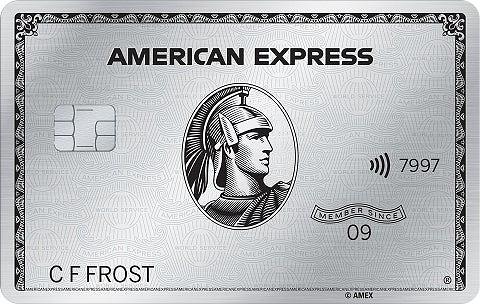
Should you get a credit card for travel?
If you go on vacation even just once a year, a credit card with travel rewards can quickly pay off.
While traveling, a credit card can offer some unique benefits over cash or a debit card. Travel protections (in case of lost baggage, delays, rental car issues, and more), waived foreign transaction fees, and rewards on your travel purchases can make any trip more efficient and affordable.
The key is choosing the right card for your travels.
Frequent travelers may save a lot of money using premium travel credit cards with high annual fees and thousands of dollars in yearly credits — but they’re not for everyone. Your most valuable vacation credit card may not offer airport lounge access or credits toward airline incidental fees but instead focus on everyday rewards value.
For example, say you prefer to vacation at a rented beach house only a few hours away by car. In that case, you probably want to prioritize rewards at supermarkets and gas stations — which can help you save both throughout your beach vacation and on regular expenses at home.
Airline and hotel cards
For some, co-branded travel credit cards with airlines and hotels may be more useful for vacation savings. Just like premium rewards cards, though, these cards aren’t universal.
If you fly multiple times per year, live near an airline’s hub city, or really value a specific airline loyalty status, you can get added benefits and more miles with a co-branded airline card. You may even get free checked bags, a faster path toward elite status, flight discounts, or companion benefits.
Similarly, a hotel credit card is helpful if you strongly prefer a specific hotel chain. If you have status with the hotel or go on vacation to the same destination each year, opening a hotel credit card can help you earn points toward award nights more quickly, reach elite status, and gain other perks for each stay.
Read more about our top airline credit cards and hotel credit cards.
Before you choose an airline card or hotel card, make sure to compare them to more general travel rewards cards. Look back at your past spending and travel — or ahead to any upcoming trips — and make sure you choose the card that’s going to help you both earn the best rewards on your typical purchases and redeem those rewards in a way that saves you the most on your trip.
Choosing a credit card by type of vacation
Travel cards come in many different forms, and it can pay to find the one best suited for your travel. Here are a few common types of vacations and what you should look for in a credit card for each:
International trips
When choosing a card for international travel, the first thing to look for is no foreign transaction fees. These fees are typically around 3% of each purchase abroad, which can add up to big savings throughout your trip.
Then, think about the expenses you’ll incur for an international trip, such as airfare and hotel bookings. Your credit card can make a big difference in the amount you’ll save while booking these costly expenses. Look for a great rewards rate with airlines and hotels (or when booking through the credit card rewards program portal) as well as any potential savings you can get with statement credits and other benefits.
Finally, when traveling internationally, you don’t want to risk not being able to use your card to make a purchase. Visa and Mastercard are generally considered the most widely accepted credit card networks — so you may want to ensure you have one of these in your wallet. It can also pay to bring along multiple cards, just in case you run into any issues.
Here are some options to consider for your international trip:
Road trips
You might have some different expenses to plan for with a road trip. Most likely, fueling up at gas stations will make up a large portion of the cost — so you probably want to prioritize gas rewards from your potential credit card. Additionally, you may be stocking up on food at grocery stores just as often as you stop for a bite at a restaurant or drive-thru. Think about whether supermarket rewards, dining rewards, or both might best fit your budget.
Another thing to consider is whether you’re renting a car for your trip or bringing your own. If you rent, look for a card with travel protections — especially for car rentals. Many come with auto rental collision damage waivers, emergency assistance services, and more protections that can save you money and time in a pinch.
These are some great cards today you can use before you hit the road:
Cruises
Unlike other forms of travel, many cruises are relatively inexpensive while onboard — but require a lot of up-front costs. Prioritize cards that will reward the money you spend on travel expenses, including both the cost of the cruise itself and how you’ll travel to get there. If the port city is located near your home, that might include gas costs and parking. If you need to fly into a different city, then you’ll probably need to account for the higher costs of airfare and a hotel room.
Depending on your cruise destination, you might also prepare for excursion expenses, too, whether you plan to dine off-ship or spend with a local merchant. Think about the rewards you can earn on this spending, as well as how to avoid foreign transaction fees for destinations outside of the U.S.
Here are some of our top credit card picks for cruise travelers:
Read more: Best credit cards for cruises
Credit cards for vacation: FAQ
Is it worth getting a credit card for travel?
Depending on your spending and travel habits, using a vacation credit card can be well worth the effort. While travel cards often come with an annual fee and require good credit, the benefits can easily outweigh the costs with just a few short trips a year.
That said, travel cards may require more strategizing than a beginner-friendly rewards card. You may need to do some research to maximize the benefits and rewards on offer, and redeeming your points for future travel may take some extra planning.
If you don’t travel at least occasionally or want a simpler rewards program to track, a straightforward cash-back card may be a better fit.
Read more: Are travel credit cards worth it?
How many credit cards should you take on vacation?
It can be useful to carry multiple credit cards on vacation.
For example, your go-to card might charge foreign transaction fees or work on a network that’s not widely accepted outside the U.S. When traveling abroad, multiple cards from different issuers or networks can help you avoid any unexpected issues.
Another example might revolve more around rewards. Say you prepaid all your travel expenses, and your spending on vacation will center around meals, souvenirs, and attractions. You may have a card best suited for rewards on those purchases, but consider also bringing the travel rewards card you used to book your flights, hotels, and rental cars — just in case. If you need to use the card’s travel protections or confirm your reservation with the travel company at check-in, it may be useful to have it on hand.
What credit score do you need for a travel credit card?
For most travel credit cards, you’ll need at least a good credit score — or a FICO score of at least 670. You may want to see if you qualify for any preapproval offers before you apply to make a more informed decision about your application.
If you don’t think you’ll qualify with your existing credit score, it may be better to wait and start earning travel rewards later. In the meantime, improve your credit by making timely payments every month, keeping your credit utilization low, and maintaining other good credit card habits.
Our methodology
At Yahoo Finance, we’ve compiled several lists of our favorite travel cards; you can find our top picks for airlines, hotels, gas stations, and many more.
We use proprietary rubrics to assign credit cards a rating based on details like annual fee, APR, welcome offer, rewards rates, redemption options, security measures, customer service, access to credit score, and more.
We used these lists and rubrics to compile our top credit cards for vacations. We first determined several superlatives that fit a wide range of vacation types and what we believe vacationers seek from a travel credit card. Then, we took those superlatives and matched them with the most rewarding cards — pulling from our existing lists of best cards and those cards that receive the highest ratings within our rubric.
However, you won’t find co-branded travel or business credit cards on this list. While these cards can be valuable under specific circumstances, we focused on general travel cards that fit the broadest ranges of consumers and vacation types.
This article was edited by Alicia Hahn
Editorial Disclosure: The information in this article has not been reviewed or approved by any advertiser. All opinions belong solely to Yahoo Finance and are not those of any other entity. The details on financial products, including card rates and fees, are accurate as of the publish date. All products or services are presented without warranty. Check the bank’s website for the most current information. This site doesn’t include all currently available offers. Credit score alone does not guarantee or imply approval for any financial product.
Credit: Source link



